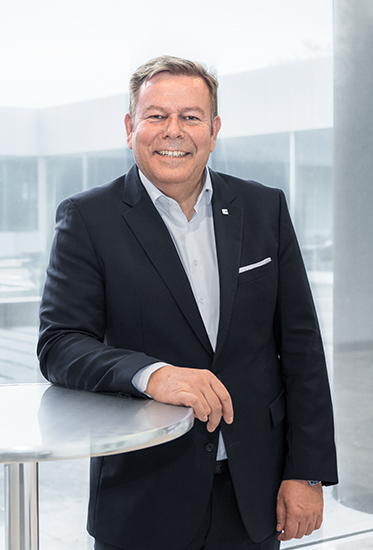Interview with Oliver Kinkel Head of Region Europe
»Clariant is well positioned in Europe«
»Clariant is well positioned in Europe«
To highlight Clariant’s global activities, the report features one business region each year. This year, the focus is on Europe. Oliver Kinkel, Head of Region Europe, discuss the role Europe plays for Clariant today and in the future. The photo essay One Clariant shows how one of Clariant’s European employees is driving change and creating value.
While growth expectations for the region are moderate, Europe is Clariant’s backbone with 34% of global sales, 44% of the global workforce, and a decisive contribution to Clariant’s global research and development.
Oliver Kinkel Clariant in Europe achieved record sales of CHF 2 billion with a local currency growth of 2% in 2016. With this growth we were able to outperform the market. On the back of an overall solid global economic environment we are carefully optimistic also for 2017. However, there is no tailwind pushing toward strong growth of the region’s chemical industry. Furthermore, in 2017 we will have elections in several European countries which might impact the macroeconomic environment. That said, effects from the UK decision to leave the European Union can hardly be assessed at this point. Nevertheless, Clariant is well positioned in Europe to successfully serve the industries and markets in Europe. Additionally, we continue to grow our export business. With 38 sites, Europe is the region with the highest number of production sites. 44% of all employees are based here. Equally important, we host the Center for R&D and Innovation. More than 80% of Clariant’s R&D investments are spent in Europe.

»On the back of continued productivity improvements and innovation with a clear focus on the development of sustainable products and solutions, we will further grow our business in the region. Our employees in Europe are very well prepared and our most important asset to achieve our ambitious goals.«
When we ask our Country Heads and Business Unit leaders for major trends influencing the chemical industry in Europe, there is one single headline in common: sustainability! European consumers and legislators are really pushing hard toward higher ecological standards to improve the overall environmental situation as well as to safeguard their family’s health in daily life. To be specific, people value the quality of their personal environment. Home care products ensuring that health and personal care products deliver convenience and a new sensory experience are more sought after than ever before. With products such as GlucoTain® and others, we are benefitting from this change in mind-set. The same is true for our industrial solutions in the field of purification for the automotive industry or our new sustainable dewatering technology INVOQUE™ for sediment management. The most prominent example is our sunliquid® technology, producing cellulosic ethanol from agricultural residues. A pilot plant in Straubing, Bavaria, is proving its benefits such as a 95% reduction of CO2 emissions compared to gasoline, an energy self-sufficient process, and most importantly, is putting an end to the food versus fuel debate. Wherever we can showcase that Clariant’s products are part of the solution and are contributing to a sustainable future, economic success will follow.
European legislators see themselves as forerunners in environmental protection and sustainability, which is a challenge for our industry as it creates an unfavorable cost position compared to other regions. The same is true for social regulations. But both areas also have a positive flipside. Standards set here force us to develop technologies that are globally state of the art. This provides us with a competitive edge when these standards are adopted in other regions. For our Business Unit Catalysts, Europe might no longer be the biggest market, but it still is the region where we develop technologies for demanding customers and partners, meeting standards that put us in the lead in emerging markets.
Social legislation and strong social partnerships create costs and complicated sequences. However, they have created social stability and predictability for decades. Investing in chemical production requires a long-term, stable framework. Europe’s stable social and political system therefore is a strong magnet for our industry. This leads me to the only drop of bitterness concerning our legislation. Short-term politics, for example in the field of energy legislation, have created a situation where, for example in Germany, we cannot project this important cost factor more than two to three years into the future.
A substance that lowers the activation energy, thereby increasing the rate of a chemical reaction without being consumed by the reaction itself (Clariant Business Unit Catalysts). VIEW ENTIRE GLOSSARY